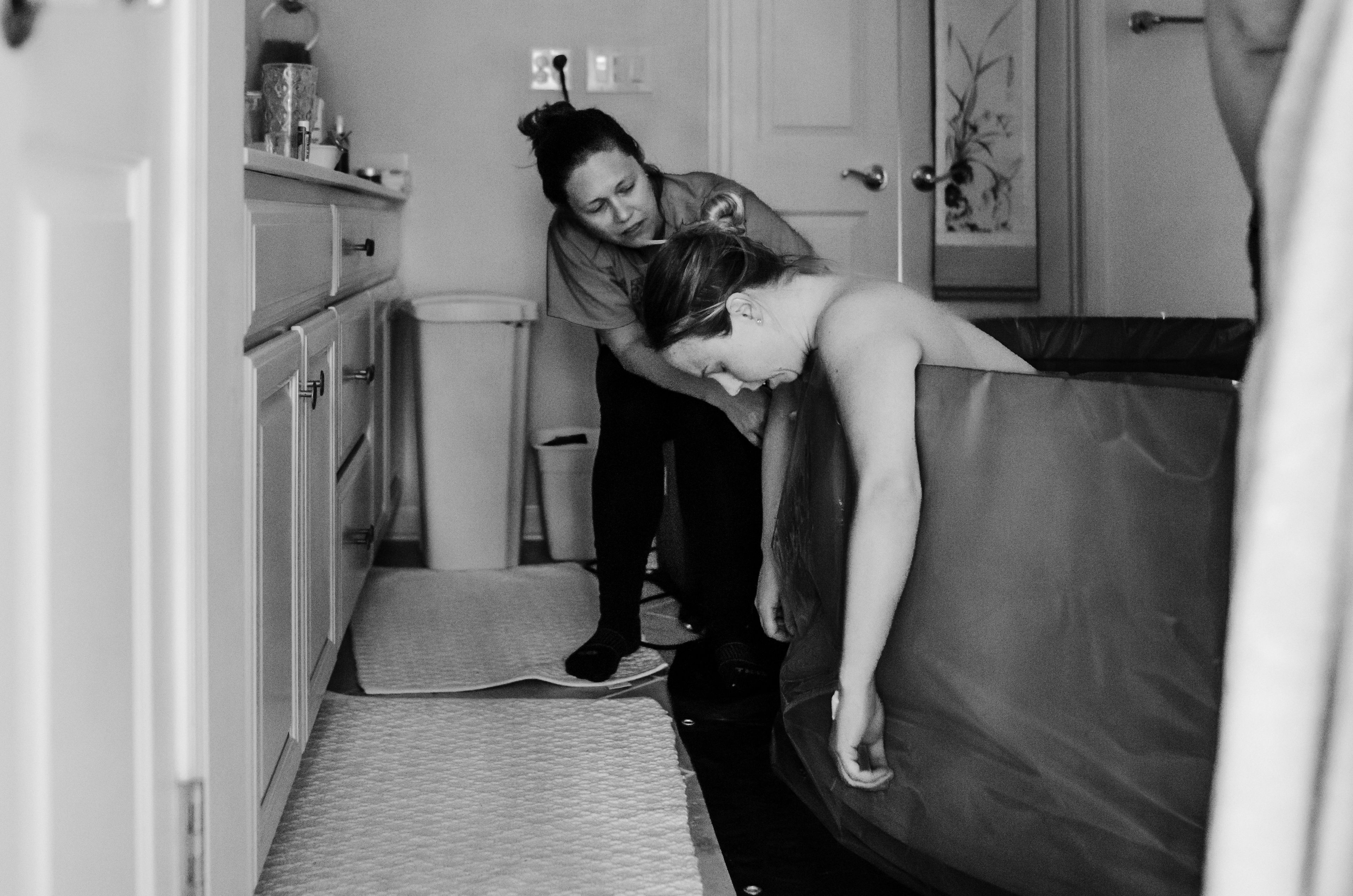
Who Gets To Be In The Delivery Room?
Open communication and clear boundaries are also very important here when we're talking about who is going to be present during childbirth.
When someone is giving birth, who do you think should be in the delivery room?
Take a moment to consider your immediate response.
Think about what family members should be in attendance. Should it just be the spouse? Should the person's mother be in the room? What about their mother-in-law?
I was really surprised by this issue because I didn't think this would be such a debate. However, I have found that some women of older generations, both mothers and mothers-in-law, seem to feel that they should be included in the birth of their grandchildren.

When I say “included,” they mean right there when the baby is coming out. Many argue that they should be among the first to hold the baby and that they're right and entitled to it. There's a lot of language like that. And I have to say this is kind of unexpected, but the Internet seems to be overwhelmingly divided on this debate. Young millennial and Gen Z mothers believe the person giving birth gets to decide who is in the delivery room.
Some Gen X and Boomer mothers and mothers-in-law believe that they have a right to be there, especially if they allowed their family members to be in the delivery room with them. And so that's an essential part of this discourse. Many of these women are saying, "My mother-in-law was in the room with me. Why wouldn't you do it?" It feels as if they sacrificed that or maybe didn't want to do it, but they just did what was expected of them. And now they think they should get that back.
So I started looking deeper into this and I wanted to see some of the stories that people had related to this. Here are a few stories I found that highlight this issue:
- One person said, “My mother-in-law showed up mid delivery, demanding to be let in. And let me tell you, my nurses were ready to throw down.”
- Another person said, “Not only did she show up, but she lied to the nurses and told them she was my mother.”
- A mother-in-law at the hospital put up a stink about leaving when it came time for pushing and then popped in twice to make sure we didn't “forget about her.”
- Another woman told her mom she didn't want my mother-in-law in the room and got berated for it, so now she doesn’t want either of them in the room.
- Somebody else said, “My mother-in-law threw a huge tantrum while I was in labor and still refuses to speak to my mom because I allowed her, my own mother, in the delivery room.”
- “My mother-in-law cried saying I refused her of having a relationship with my daughter because she wasn't invited in the delivery and I wasn't open to shared feeding.
Every family is different.
Some people don't want the child's father or other parent in the room if that relationship is strained. Others do not want their mothers there and prefer to have their partner, a friend, or another family member. And some women even choose to give birth by themselves.
I've seen a lot of very rigid takes online, like: only the partner should be in the room or a mother-in-law should never be there. But it's, of course, a personal decision that depends on the preferences and dynamics of the person giving birth or the other parent, etc. There's room for a lot of nuance.
What To Consider
It might be good for parents of adult children who are having kids and anyone who is about to give birth or thinking about having kids to think about some of these questions and these norms. And remember, birth is not a spectator sport. It is a medical procedure and it is extremely vulnerable. And you want to have someone that's there to support you and only you. Giving birth is also a deeply personal and intimate experience, and it's essential for the expectant mother to feel comfortable and supported during labor and delivery.
Some women may feel more relaxed and at ease with only their partner or a selected few trusted individuals present in the delivery room. It's crucial to respect the expectant mother's wishes and prioritize her privacy and comfort during this vulnerable time.
If you are a family member of someone who is pregnant, thinking about becoming pregnant or going to give birth soon, the question you should always come back to is: How can I make this person most comfortable? This is not about me. It's about them, their safety, and their level of comfort. And so, how can I be the most supportive?
Open communication and clear boundaries are also very important here when we're talking about who is going to be present during childbirth. And we want to make sure that the expectant mother feels empowered to express her preferences and her concerns openly and that she's not going to be met with like a ton of pushback and shaming and arguing because that is what she wants. And so if the person giving birth is uncomfortable with the idea of their mother-in-law being in the room, that needs to be considered and respected. Finding other ways for the mother-in-law to offer support and involvement during the birthing process is possible. And that might mean helping care for other children or pets, cooking, cleaning, doing laundry, taking care of the home, sending things to the hospital, updating other members of the family. There are so many other ways to be helpful outside of just being in that delivery room, especially if that does not feel helpful to the person who is most vulnerable at that moment.
Cultural Norms Matter
Of course, cultural norms and personal beliefs will influence whether or not a certain family member is present during childbirth. In some cultures, it's customary for extended family members to be present during childbirth or to offer support and celebrate the baby's arrival in a specific way. But in other cultures, it's also considered a more private affair, and only immediate family members may be invited to attend.
As a therapist and personally, I believe the mother's comfort should be prioritized over some of those cultural traditions that may be outdated and/or harmful. Maybe the women who practiced them before felt uncomfortable with that, and it was just put on them as an expectation. And that's the big generational difference I see here, which is that some of the women today, regardless of cultural background, are much more willing and able to speak out about things that make them uncomfortable or upsetting to them. They are not as willing to do something simply because that is how it has always been done. And that can be very difficult for a generation of people who were taught that they were not allowed to do that or if they didn't have the skills to speak up and set boundaries. And so there is this immediate gut reaction for some generations of, "No, that's not how we do things. That's not how it's supposed to be.”
So, instead of labeling people as selfish, ungrateful, individualistic, or not thinking about the family, it's important to think about what you may have wanted when you were so vulnerable and having a hard time. Did you really want all those people there around you? If you had been given the choice, what would you have chosen? If you still would have chosen to have that, how would it have felt to at least have been given the option? Can you imagine how someone else would feel differently?
There are no fixed rules here, but these are some questions that I would work through with anyone you might want to include in the delivery room. I would ask yourself these questions:
- Will this person be helpful?
- Will they respect me if I ask them to leave?
- Imagine that day. If you're going to get rushed in for a C-section or something terrible is happening, or it's getting very stressful, if you said to them, “Hey, I need some space,” would they be able to respect that boundary?
- Will they respect my specific boundaries about telling people I am in labor and giving updates?
- Do they have a calming presence or will I be managing their moods?
- Will they respect my medical decisions throughout the process?
- Will I feel comfortable being vulnerable in front of them?
- Am I doing this for them, or am I doing this for myself? Or is it a combination of both? Is this something I want to do for them?
If you have a family member who is yelling at you, telling you that they should get to be there, that it's their right, and you allow them to be there, I would bet that it's because you're trying to manage their reaction and how they're going to treat you. You are attempting to manage their experience of meeting the baby and trying to do damage control by allowing them to be in the room. This is likely not really because it's meaningful for you or them. It's more about just putting out fires, which is something to consider. The person you want in the room with you probably won't demand to be there or have to threaten you to secure an invite.
So what do you think? Who should be in the delivery room?
From CALLING HOME with Whitney Goodman, LMFT: Who Gets To Be In The Delivery Room?, Sep 24, 2024